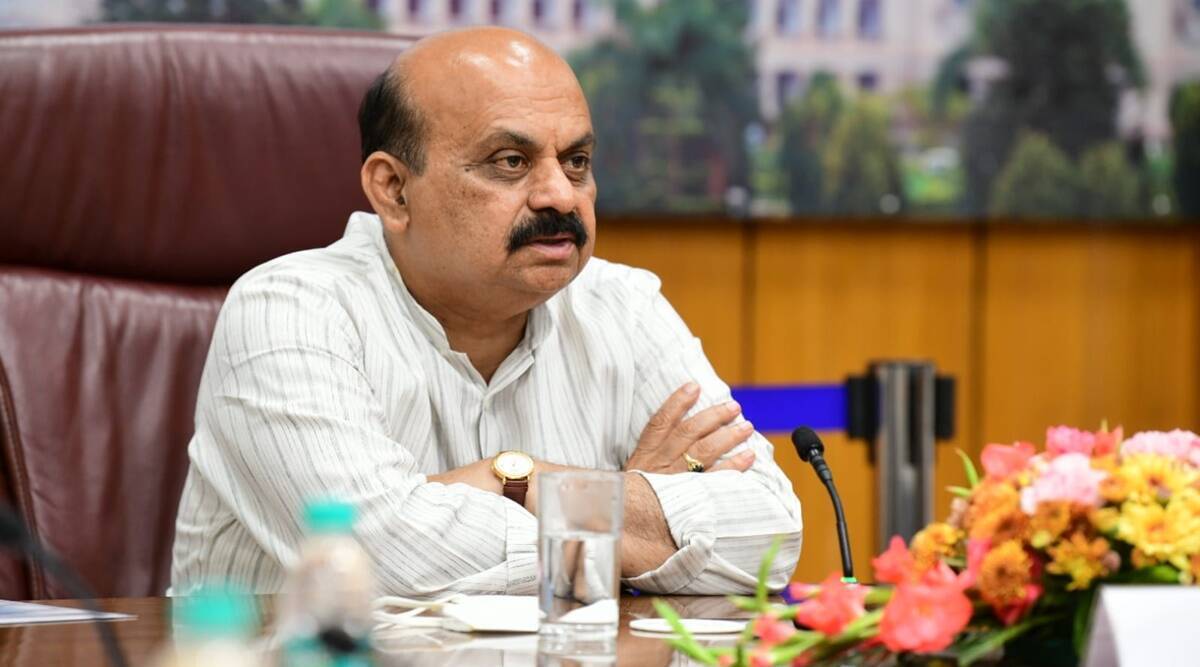 The development, however, prompted Chief Minister Basavaraj Bommai to call a high-level meeting on Saturday. (Photo: Twitter/@BSBommai)
The development, however, prompted Chief Minister Basavaraj Bommai to call a high-level meeting on Saturday. (Photo: Twitter/@BSBommai) Two citizens of South Africa who arrived in Bengaluru tested positive for Covid-19, briefly sparking concerns over the new Omicron variant detected in that country before a genome sequencing test found that they had the Delta strain.
The development, however, prompted Chief Minister Basavaraj Bommai to call a high-level meeting on Saturday. Bommai said authorities would intensify screening of international passengers at the airports and make the RT-PCR test report compulsory for those arriving from Kerala and Maharashtra.
K Srinivas, the Deputy Commissioner of Bengaluru Rural district under which Kempegowda International Airport falls, told The Indian Express: “Two South African nationals who arrived to Bengaluru on 11 and 20 November respectively were tested positive for Covid-19 and were traced living in Bengaluru. They have been isolated and are under treatment. We have found them to have the delta variant.”
A total of 584 people arrived at the Bengaluru airport in November from 10 high-risk countries and 94 of them have returned from South Africa.
Three teams deputed round the clock at KIA are monitoring travellers before they come out of the airport. All international travelers are being tested, said Srinivas.
The international arrivals from South Africa, Botswana and Hong Kong will have to undergo a mandatory RT-PCR test. The international travelers who have arrived in Bengaluru between 12-27 November will be tracked and tested through RT-PCR. Those testing positive will be placed under institutional isolation in hospital for 10 days. Genome sequencing will be fast-tracked, officials said.
The government issued a circular stating that the daily Covid19 testing targets would be increased from 60,000 to 80,000 per day. Along with influenza-like illness (ILI) and severe acute respiratory infections (SARI), the teams have been asked to conduct tests on selected groups of students, teachers, staff of hotels, shop keepers of malls and markets, catering staff, factory personnel, office goers, staff in pubs and bars. The tests in Bengaluru city have been increased by 5,000.
In Saturday’s meeting, it was decided to impose a temporary ban on cultural programmes in schools and colleges, make second doses of vaccination compulsory for those working in government offices, malls, hotels, cinema halls, zoos, swimming pools and libraries, Revenue minister R Ashok said.
The state government has also decided to make an RT-PCR report compulsory for those entering the state from Kerala and Maharashtra. Students from Kerala who arrived in the last 16 days will have to do a compulsory RT-PCR test for a second time. Students in hostels who have got a negative RT-PCR report would have to get the test done again on the 7th day after the first report, he added.
Ashok said those who test positive will be directly taken to a hospital for treatment.
As part of combating a potential third wave, the Karnataka government has urged the Union government to administer booster doses. Ashok said: “We have urged the union government to allow the state to administer the booster dose, especially for the front line workers. We may get the go ahead from the centre in a week.”
The vaccination campaign has covered a large segment of the population. However the need for the booster dose is being felt, especially for the front line workers who got vaccinated at the very beginning of the vaccination campaign.
Centre has been requested to permit the state to administer the Booster dose for front line workers. The Centre is likely to respond positively to the state’s request, Ashok said.
- The Indian Express website has been rated GREEN for its credibility and trustworthiness by Newsguard, a global service that rates news sources for their journalistic standards.

